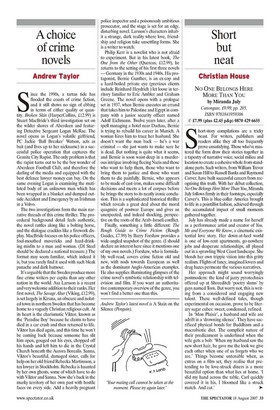A choice of crime novels
Andrew Taylor Since the 1990s, a tartan tide has flooded the coasts of crime fiction, and it still shows no sign of ebbing in terms of either quality or quantity. Broken Skin (HarperCollins, £12.99) is Stuart MacBride's third investigation set on the wilder shores of Aberdeen and featuring Detective Sergeant Logan McRae. The novel opens as Logan's volatile girlfriend, PC Jackie 'Ball Breaker' Watson, acts as bait (and lives up to her nickname) in a successful police operation that captures the Granite City Rapist. The only problem is that the rapist turns out to be the boy wonder of Aberdeen Football Club, and therefore the darling of the media and equipped with the best defence lawyer money can buy. On the same evening Logan is examining the mutilated body of an unknown man which has been wrapped in a blanket and dumped outside Accident and Emergency by an Irishman in a Volvo.
The two investigations form the main narrative threads of this crime thriller. The procedural background detail feels authentic, the novel rattles along like a bolting horse, and the dialogue crackles like a firework display. MacBride focuses on his police officers, foul-mouthed mavericks and hard-drinking misfits to a man and woman. (DI Steel should be declared a national treasure.) The format may seem familiar, which indeed it is, but you rarely find it used with such bleak panache and dark humour.
It's arguable that the Swedes produce more fine crime writers per capita than any other nation in the world. Asa Larsson is a recent and very welcome addition to their ranks. Her first novel, The Savage Altar (Viking, £12.99), is set largely in Kiruna, an obscure and isolated town in northern Sweden that has become home to a vaguely Christian religious cult. At its heart is the charismatic Viktor, known as the 'Paradise Boy' because he claims to have died in a car crash and then returned to life. Viktor has died again, and this time he won't be coming back because someone has slit him open, gouged out his eyes, chopped off his hands and left him to die in the Crystal Church beneath the Aurora Borealis. Sanna, Viktor's beautiful, damaged sister, calls for help on her old friend Rebecka Martinsson, a tax lawyer in Stockholm. Rebecka is haunted by her own ghosts, some of which have to do with Viktor and Sanna. Now she's back in the murky territory of her own past with hostile faces on every side. Add a heavily pregnant police inspector and a poisonously ambitious prosecutor, and the stage is set for an edgy, disturbing novel. Larsson's characters inhabit a strange, dark reality where love, friendship and religion take unsettling forms. She is a writer to watch.
Philip Kerr is a novelist who is not afraid to experiment. But in his latest book, The One from the Other (Quercus, £12.99), he returns to the setting of his first three novels — Germany in the 1930s and 1940s. His protagonist, Bernie Gunther, is an ex-cop and a hard-boiled private eye (previous clients include Reinhard Heydrich ) let loose in territory familiar to Eric Ambler and Graham Greene. The novel opens with a prologue set in 1937, when Bernie executes an errand that takes him to Palestine and Egypt in company with a junior security officer named Adolf Eichmann. Twelve years later, after a spell managing a hotel near Dachau, Bernie is trying to rebuild his career in Munich. A woman hires him to trace her husband. She doesn't want the man back — he's a war criminal — she just wants to make sure he is dead. But nothing is quite what it seems, and Bernie is soon waist-deep in a murderous intrigue involving fleeing Nazis and those who want to help them, those who want to bring them to justice and those who want them to die painfully. Bernie, who appears to be made of cast-iron, makes some difficult decisions and meets a lot of corpses before he brings the story to its neatly ironic conclusion. This is a sophisticated historical thriller which reveals a great deal about the moral quagmire of postwar Europe and gives an unexpected, and indeed shocking, perspective on the roots of the Arab–Israeli conflict.
Finally, something a little different: The Rough Guide to Crime Fiction (Rough Guides, £7.99) by Barry Forshaw provides a wide-angled snapshot of the genre. (I should declare an interest here since it mentions one of my own novels.) Forshaw, who is formidably well-read, covers crime fiction old and new, with nods towards European as well as the dominant Anglo-American examples. He also supplies illuminating glimpses of the crime novel's symbiotic relationship with television and film If you want an authoritative contemporary overview of the genre, you won't find a better one than this.












































 Previous page
Previous page